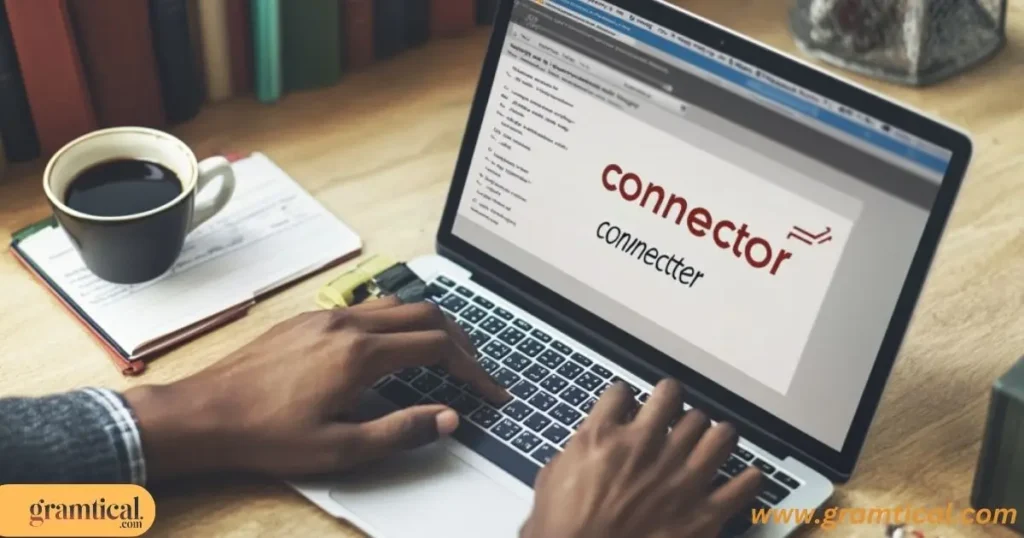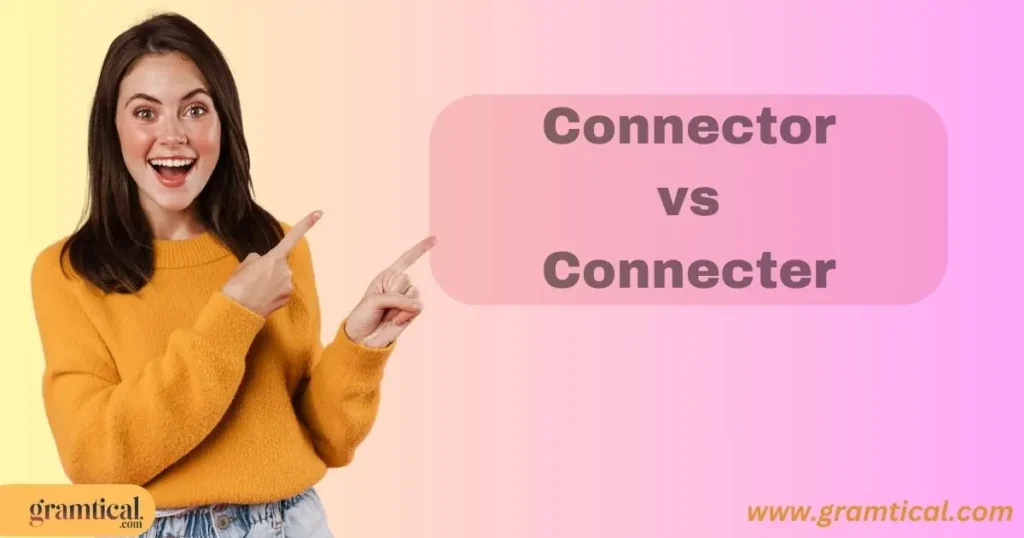- 1. Understanding “Connector vs. Connecter” (Conversation Explained with Examples)
- 2. How to Use “Connector vs. Connecter” Correctly (Explanation, Scenario, Subject, and Email Example)
- 3. Common Mistakes and How to Avoid Them about “Connector vs. Connecter”
- Of Course vs. Ofcourse: Which One is Correct?
- 4. A Comparison: “Connector vs. Connecter” (3 Examples)
- 5. What’s the Difference Between “Connector vs. Connecter” (3 Examples)
- 6. A Quick Comparison Table About “Connector vs. Connecter”
- 7. Why Does This Matter?
- 8. Practical Exercises: “Connector vs. Connecter” (5 Examples)
- Key Insight of Connector vs. Connecter
- Final Take
“Connector vs. Connecter: The battle between the correct spelling and the commonly misused form.”
When it comes to English, spelling can sometimes be tricky, especially when two words sound the same but are spelled differently.
One of the most common spelling issues is the confusion between “connector” and “connecter.” While these two words may seem similar, their use and correctness differ.
Many people often wonder, which one is the right choice for their writing? Understanding when and how to use “connector” versus “connecter” is important for clear and effective communication.
The confusion between “connector” and “connecter” is common, but only one is grammatically correct. Whether you’re writing an email, a professional document, or just texting a friend, it’s essential to know the difference between these two words to maintain proper usage.
This article will break down the differences, the correct contexts for each, and some practical examples to help you understand which one to use and when.
By the end of this post, you’ll be confident in your choice between “connector” and “connecter.”
1. Understanding “Connector vs. Connecter” (Conversation Explained with Examples)
To begin, let’s first explore what both words mean. While they may seem like they refer to the same thing—something that connects—only one of them is correct in standard English usage.
- Connector is the correct form. It refers to an object, person, or device that joins or links things together. For instance, “The electrician used a connector to join the wires.”
- Connecter, on the other hand, is considered an incorrect spelling. It’s a common misspelling, but it doesn’t appear in standard dictionaries and isn’t used in formal writing. So, using “connecter” is an error, and it’s best to stick with the correct spelling, “connector“.
Example: - Correct: “The connector joined the two pieces of pipe together.”
- Incorrect: “The connecter joined the two pieces of pipe together.”
By now, it should be clear that “connector” is the appropriate word to use.
2. How to Use “Connector vs. Connecter” Correctly (Explanation, Scenario, Subject, and Email Example)

Now that you know the distinction between “connector” and “connecter,” let’s dive into the contexts where you’ll most often use “connector.”
Scenario 1: Electronics and Engineering
In the world of electronics, “connector” refers to a part that joins two or more components, such as wires, plugs, or cables.
Example in a sentence:
- “The technician carefully installed the connector to ensure the wires were securely connected.”
Scenario 2: Relationships and Networking
The word “connector” can also be used in a figurative sense, describing a person who facilitates connections between people, ideas, or businesses.
Example in a sentence:
- “Jane is an excellent connector in the tech industry, linking startups with investors.”
Email Example:
In professional communication, here’s an email example where “connector” is correctly used:
Subject: Troubleshooting Cable Issues
Dear Tom,
I hope this message finds you well. I wanted to follow up on our previous conversation regarding the cable installation. As per your suggestion, I’ve ordered a new connector to fix the problem, and I’ll be installing it tomorrow. Please let me know if you have any additional instructions.
Best regards,
Sarah
As you can see, “connector“ is the right choice in both technical and professional contexts. “Connecter” would be incorrect in all of these scenarios.
3. Common Mistakes and How to Avoid Them about “Connector vs. Connecter”
It’s easy to confuse “connector“ with “connecter,” but here are a few common mistakes people make, along with tips on how to avoid them:
Mistake 1: Using “Connecter” in Professional Writing
Many people mistakenly use “connecter” in emails, reports, or technical documentation. The key to avoiding this is remembering that the correct term is always “connector”. If you’re ever unsure, simply check your spellings using a reliable dictionary or word processor spell check.
Example:
- Incorrect: “The connecter failed to work properly.”
- Correct: “The connector failed to work properly.”
Mistake 2: Using “Connecter” in Informal Settings
Even in informal settings, using “connecter” can confuse your audience. Stick to “connector” to avoid awkwardness and maintain clarity.
Example:
- Incorrect: “I need to buy a connecter for the charger.”
- Correct: “I need to buy a connector for the charger.”
Of Course vs. Ofcourse: Which One is Correct?
Mistake 3: Overusing “Connector” When It’s Not Necessary
Sometimes, people overuse the word “connector” when it’s not even necessary. For instance, in sentences where the context already implies a connection, the word might be redundant. Ensure that you’re using it only when it’s needed.
Example:
- Redundant: “We need a connector to connect the wires.”
- Improved: “We need a connector for the wires.”
By avoiding these common mistakes, you’ll be able to communicate more clearly and confidently in both written and spoken English.
4. A Comparison: “Connector vs. Connecter” (3 Examples)
Now, let’s summarize the differences between “connector” and “connecter” with a few comparative examples:
Example 1: Technical Usage
- Correct: “The electrician used a connector to attach the wires.”
- Incorrect: “The electrician used a connecter to attach the wires.”
Example 2: Figurative Usage
- Correct: “Tom is a great connector of people in the business world.”
- Incorrect: “Tom is a great connecter of people in the business world.”
Example 3: General Use
- Correct: “The connector broke, so we need to replace it.”
- Incorrect: “The connecter broke, so we need to replace it.”
As you can see from these examples, “connector” is the universally accepted spelling, and “connecter” should be avoided.
5. What’s the Difference Between “Connector vs. Connecter” (3 Examples)
The primary difference between “connector” and “connecter” is that “connector” is the correct spelling, while “connecter” is a common misspelling.
Example 1: Electrical Engineering
- Correct: “The connector links the two wires together.”
- Incorrect: “The connecter links the two wires together.”
Example 2: Human Connection
- Correct: “Sarah is an excellent connector who builds networks within the company.”
- Incorrect: “Sarah is an excellent connecter who builds networks within the company.”
Example 3: Product Design
- Correct: “The product comes with a built-in connector for easy installation.”
- Incorrect: “The product comes with a built-in connecter for easy installation.”
6. A Quick Comparison Table About “Connector vs. Connecter”
|
Word |
Meaning |
Correct Usage Example |
|
Connector |
An object or device that joins or connects things. |
“He used a connector to link the cables.” |
|
Connecter |
A common misspelling of “connector.” |
Incorrect form. It should be avoided. |
7. Why Does This Matter?
Using the correct spelling of “connector“ ensures that your writing remains professional and precise. It’s important to be aware of these subtle differences in spelling because using the wrong form can make your writing seem careless or uninformed. Whether in emails, reports, or casual conversations, getting the spelling right builds credibility and reflects well on your communication skills.
8. Practical Exercises: “Connector vs. Connecter” (5 Examples)
Here are five examples to help you practice the correct usage of “connector”:
- “The connector was faulty, causing the wires to disconnect.”
- “She was the key connector between the two departments.”
- “You’ll need a connector to join these pieces of metal.”
- “A new connector was installed to improve the connection.”
- “I need a connector for the two cables in the router.”
Key Insight of Connector vs. Connecter
Q1: Is “connecter” a real word?
No, “connecter” is a common misspelling of “connector” and should not be used in professional or formal writing.
Q2: Can I use “connector” in figurative language?
Yes, “connector” can also be used figuratively to describe a person who connects people or ideas.
Q3: What is the correct spelling for something that joins things together?
The correct spelling is “connector”.
Q4: Can I use “connecter” in casual conversation?
While people might use “connecter” informally, it is still incorrect. It’s better to stick with “connector”.
Q5: How do I remember the correct spelling of “connector”?
Do I remember the correct spelling of “connector”?** One easy way to remember is to think of “connector” as a tool that connects two things, which aligns with the correct spelling.
In conclusion, when in doubt, always opt for “connector”—the correct and widely accepted spelling. Using the right word will enhance your writing, making it more accurate and professional.
Final Take
In conclusion, the correct spelling between “connector“ and “connecter” is clear: “connector” is the only correct form to use.
“Connecter“ is a common misspelling and should be avoided in both formal and informal contexts. Understanding the distinction between these two terms helps maintain the clarity and accuracy of your writing.
By using “connector” correctly, whether in technical, professional, or casual conversations, you ensure your communication is precise and credible.
Always remember that the goal is to make your writing easy to understand, and using the right words in the right context plays a vital role in achieving that.

Hi! I’m Zadie Smith i simplify English grammar, making it accessible and enjoyable. At gramtical.com, I help you master the rules for clearer communication

